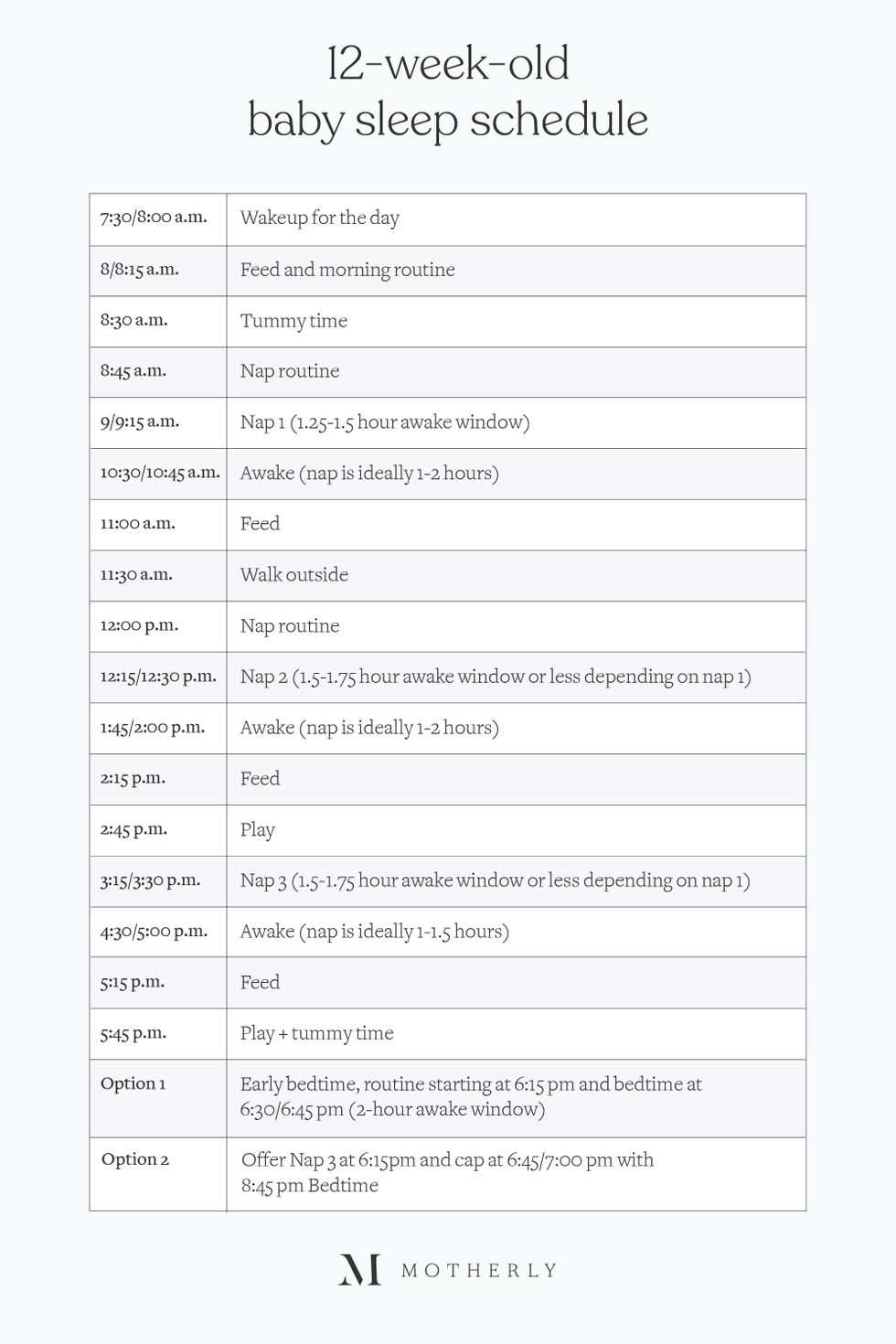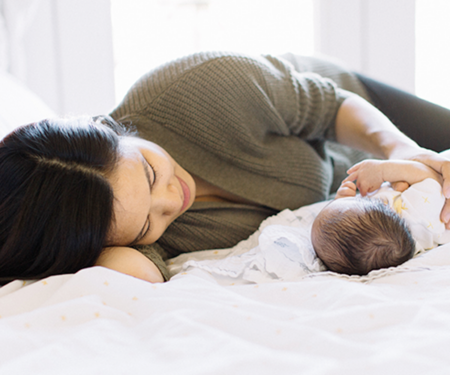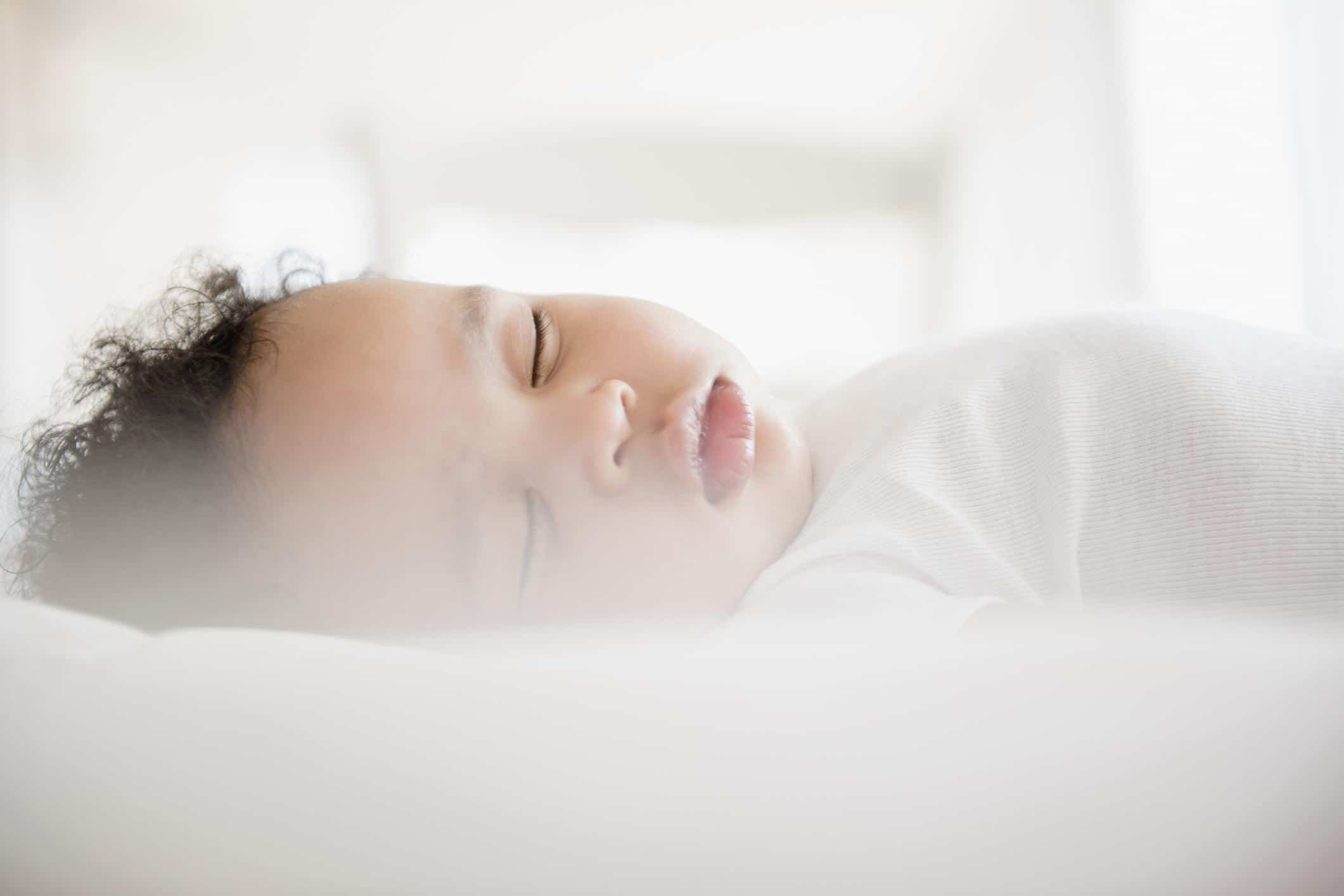How much sleep does a 12-week-old baby need?
Expert guidance tips on your newborn's sleep schedule.

As your baby approaches the 12-week mark, you may be wondering if there is any hope for more sleep in your future. We have good news: there totally is!
Twelve weeks marks an important milestone in your baby’s development when they start moving towards a more regular sleep-and-wake pattern. Translation? More sleep is on the horizon, mama, we promise. Of course, like all things with parenting, every baby is different and you may need a little help navigating sleep with your growing baby.
Related: Baby Feeding Guides & Schedules
Motherly's Digital Classes
By week 12, your baby might be giving you some longer stretches of sleep (yay!). Read on for advice on what a sleep schedule for a 12-week-old should look like, along with tips for catching more zzz’s.
How much sleep does a 12-week-old baby need?
Your baby still needs a lot of sleep: according to the American Academy of Sleep Medicine, a newborn should get 12-16 hours of sleep per 24 hours.
“Your baby is no longer considered a newborn in this stage, and they don’t need quite as much sleep as they did prior. My recommendation for total sleep is between 3.5-5.5 hours of day sleep and between 10-12 hours of night sleep,” says Rachel Mitchell, founder of My Sweet Sleeper. “Ideally, your baby is taking 3-4 naps with 1-2 long naps and sleeping between 10-12 hours at night. This doesn’t necessarily mean they will sleep 10-12 hours straight, but the goal is for 10-12 hours overall throughout the night. Awake windows will also lengthen slightly in this stage from 60-90 minutes to 60-120 minutes. I recommend continuing to follow 60-90 minute awake windows in between naps and no more than 2 hours before bed, if your baby can handle it.”
Related: 3-month-old baby milestones
Twelve weeks marks a big shift in your baby’s sleep, as they start to develop more of a normal wake and sleep pattern instead of the party-all-night attitude they may have shown so far. As those patterns begin to emerge, you may notice more regular wake windows during the day–and more clear signs that your baby is sleepy.
You’ll want to pay attention to your baby’s sleep cues and help them learn how to sleep (yes, learning to sleep is a skill that can be taught!) by practicing a regular sleep schedule. Every baby and family is different, but here’s an example of a sleep schedule that may be helpful for a twelve-week-old.
12-week-old baby sleep schedule

“At this stage, a lot of parents start to see consistent stretches of night sleep, so if you are still seeing that your baby is waking frequently throughout the night, take a look at their foundations and see if there is something that may be preventing them from sleeping well at night such as going to bed overtired or lack of daytime nutrition,” says Mitchell.
Wake windows for a 12-week-old
Wake windows are the amount of time your baby can stay awake during the day before she needs a nap. At twelve weeks old, that length of awake time should start to stretch out more. The National Sleep Foundation recommends 14-17 hours of sleep per day for babies 0-3 months old, but that number drops to 12-15 hours around twelve weeks. That means your baby’s wake window will gradually start to increase to a couple of hours between naps.
Sleep tips for newborns:
Week 12 marks an exciting–and important–development in babies, as the first signs of a natural circadian rhythm begin to emerge. Some babies may even start to sleep through the night at this age, which, so you’re one of the lucky ones to experience this, enjoy it! Of course, that doesn’t mean that all babies will be sleeping soundly through the night by this age, but it does mean you might notice longer stretches of sleep in your little one.
You can support the development of your baby’s circadian rhythm at this age by establishing a clear bedtime routine, like a bath followed by a special story, to signal to your baby that it’s time for sleep. Here are some more tips for encouraging your baby to sleep at twelve weeks old:
- Always place your baby on their back to sleep, not on the stomach or side. This helps to reduce the risk of Sudden Infant Death Syndrome (SIDS) and Sudden Unexplained Infant Death (SUID). The American Academy of Pediatrics initiated the “Back to Sleep” movement in 1992, and rates of SIDS/SUID have decreased dramatically since.
- Do not put anything else in the crib or bassinet. Keep plush toys, pillows, blankets, loose sheets, and bumpers out of your baby’s crib or bassinet for similar reasons as above.
- Avoid overheating. Even though they’re itty-bitty babies, you can dress them according to the room’s temperature. Don’t over-swaddle or over-layer their clothing.
- Try a pacifier. If they reject it, that’s OK. If it falls out, that’s OK. If you’re breastfeeding, you may want to wait until baby is comfortable with latching and effectively nursing before introducing a pacifier.
- Use a white noise machine. Whether your house is quiet as a mouse, or you’ve got other kids running around making noise, a white noise machine can help your baby feel soothed (and possibly tune out) in their surroundings.
- Snuggle it up. Your newborn wants your cuddles as much as you want to give them—especially if they’re fussy. Swaddle them up snugly, then rock them until they quiet down. There’s no such thing as holding a newborn too much (for safety reasons, don’t fall asleep with them in your arms).
A version of this story was published August 24, 2021. It has been updated.



